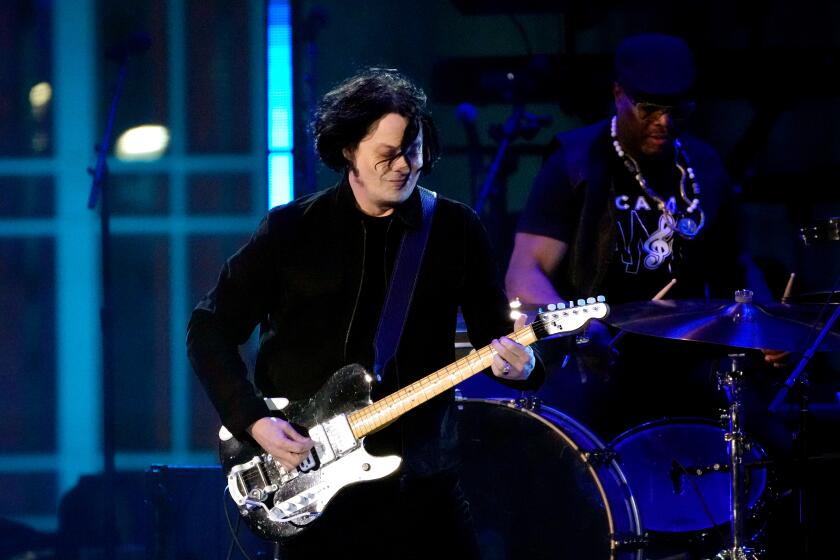Book review: ‘Three Seconds’
Three Seconds
A Novel
Anders Roslund and Börge Hellström
Translated from the Swedish by Kari Dickson
Silver Oak: 489 pp., $24.95
Appetites whetted by the astronomical success of Stieg Larsson’s “Girl Who” series, publishers and readers alike are on the hunt for the Next Big Swedish Crime Novel. What gets glossed over in that quest is the fact that four Swedish writers — Henning Mankell, Hakan Nesser, Ake Edwardson and Inger Frimansson— have toiled in the field for decades and produced among them nine powerful, award-winning books.
Instead, attention turns elsewhere, as in the case of the writing duo of Anders Roslund, a former television news reporter specializing in crime and social issues, and Börge Hellström, an ex-con and founder of a Swedish crime prevention organization. Authors of five crime novels over the last six years, the team of Roslund and Hellström has won or been shortlisted for every major Scandinavian crime novel award, including a recent award from the Swedish Academy of Crime Writers for the new novel “Three Seconds.”
The novel’s first section shifts from Erik Wilson, a Stockholm detective running several covert operatives, to a mule who’s ingested amphetamines as part of a smuggling operation to get them into Stockholm from Poland. Also in the mix is Piet Hoffman, Wilson’s most valuable undercover operative, who, using the code name Paula, served for three years as a front man for Wojtek International, a Warsaw security firm with Mafia ties.
When a drug buy goes wrong at a Stockholm flat controlled by Wojtek, Piet must stand by helplessly as a potential buyer who’s been exposed as a Danish cop is executed. Piet surreptitiously raises the alarm with the Stockholm police before escaping the scene and contacting Wilson, who helps Piet extricate himself from complicity in the murder by negotiating a deal among bureaucrats at the highest levels of the Swedish criminal justice system.
As intriguing as it sounds, Roslund and Hellström dole out the drama in scenes that suffer from too much information, erratic intercutting and a heavy-handed style that not even an able translator like Kari Dickson can smooth over. Also problematic is the unsympathetic portrait of a character appearing in the authors’ four previous novels, Det. Ewert Grens. Grens is gruff to the point of hostility and haunted by guilt about his wife Anni, a fellow police officer injured on the job who recently died after 29 years in a nursing home. Grens has been in a funk over Anni for years, reduced to sleeping on the floor in his office and grieving in a manner that would make any astute supervisor send him to a departmental shrink. Even when Grens is roused to action by the murder of the undercover Danish cop, his bitterness combined with the minute details of the investigation makes reading the novel’s first part a dreary affair.
“Three Seconds’” saving grace is Piet, whose undercover work for the Stockholm police is part of a redemptive journey from addiction and prison to a fulfilling life as a husband and father. Scenes of Piet’s double life crank up the tension and the reader’s engagement with the novel, especially when we learn his ultimate mission is to get arrested and sent to a notorious Swedish prison, enabling him to derail the Polish Mafia’s plan to control the amphetamine trade from inside the prison. Piet’s execution of a carefully laid plan to survive his assignment is engrossing, especially when the reader realizes the stress it causes him: “He was frightened of a man lying on the floor with three gaping wounds in his head and a breakthrough in a conference room in Warsaw and nights in a small cell and a death sentence that would become even more critical outside those walls and Zofia’s cold voice and the children’s feverish skin and of no longer being able to tell the difference between the truth and lies.”
The thin line that separates such truth and lies is a theme reverberating throughout “Three Seconds” and drives an explosive plot twist and coverup that propels the second part of the novel. It is here that Roslund and Hellström’s obsessive attention to detail, shifting points of view and staccato writing style turn into an asset.
Piet’s presence along with the novel’s savage dissection of societal and government corruption make “Three Seconds” a nerve-jangling ride and perhaps a kissing cousin of Larsson’s novels. “Three Seconds” also demonstrates an attitude to Sweden on the world stage that’s touched upon in some of the finer work of Mankell and other Swedish crime-writing pros. So while there is sure to be the requisite media hype surrounding the publication of “Three Seconds” in the U.S., readers who appreciate fine crime writing should seek out the Swedish masters as well.
Woods is the author of the Charlotte Justice mystery series.
More to Read
The biggest entertainment stories
Get our big stories about Hollywood, film, television, music, arts, culture and more right in your inbox as soon as they publish.
You may occasionally receive promotional content from the Los Angeles Times.






